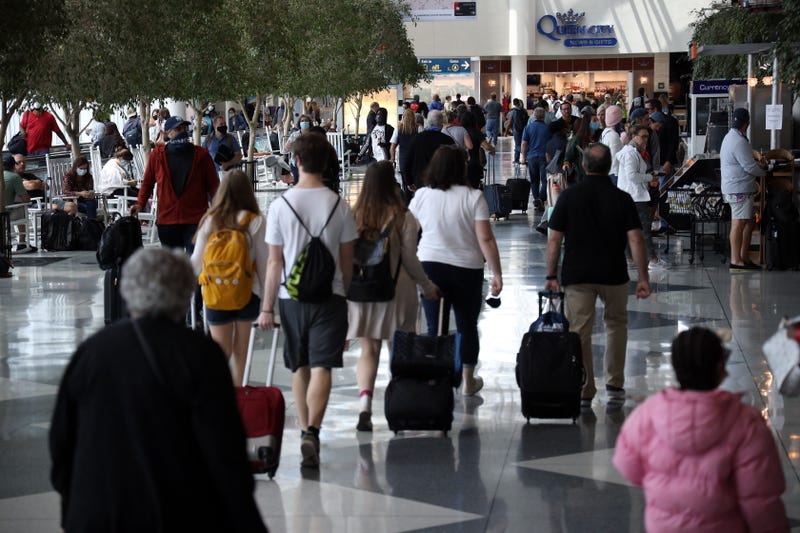
The Coronavirus pandemic continues to run rampant in North Carolina with new daily case total among the highest in the country. As containment seems unlikely in the near future, 17 states and the District of Columbia have set rules such as mandatory quarantines for people traveling to and from North Carolina.
Some states are citing a “significant community spread” with the Tar Heel state, which is defined as more than 15% coronavirus testing positivity rates. Here's the states enforcing a mandatory quarantines for people traveling in North Carolina, according to the News and Observer.
"New York, New Jersey and Connecticut require North Carolina travelers to quarantine for two weeks upon arrival. The travel advisory began in June and applies to states with “significant rates of transmission of COVID-19,” which means they have a positive coronavirus test rate that’s higher than 10 per 100,000 people or those with a seven-day rolling average in which at least 10% of tests are positive. This rule does not apply for visitors spending less than 24 hours in the state, according to New Jersey health officials.
That list of high-risk states is updated weekly. Visitors must also fill out a travel health form when they arrive.
In Connecticut, violating these rules may result in a civil penalty of $500 for each violation. In New York, travelers who leave the airport without completing the form will be subject to a $2,000 fine and may be brought to a hearing and ordered to complete mandatory quarantine.
Illinois identified North Carolina as a state with “higher risk” and asks residents to avoid traveling there and to quarantine for 14 days when they come home, but there’s no official mandate. However, Chicago requires a 14-day quarantine for North Carolina visitors traveling to Chicago and for Chicago residents traveling to North Carolina.
Massachusetts also identifies North Carolina as a high-risk state. Visitors from North Carolina and other states on that list must fill out a travel form and quarantine for 14 days or produce a negative COVID-19 test result that was administered within 72 hours of their arrival. Visitors and residents traveling to or from North Carolina must quarantine until they receive a negative test result.
Travelers could face a $500 fine per day if they don’t comply, according to the state. States become “lower-risk” in Massachusetts when the average daily cases per 100,000 people are below 10 and the positive test rate is below 5%, both measured as a 7-day rolling average.
Pennsylvania identifies North Carolina as a state with “high amounts of COVID-19 cases.” The state requires a 14-day quarantine for visitors to Pennsylvania from North Carolina and Pennsylvania residents traveling to NC.
New Mexico has also designated North Carolina as “high risk,” along with most other states. People traveling to New Mexico are required to quarantine for 14 days or the length of their stay in New Mexico, whichever is shorter.
Washington, D.C. put North Carolina on its list of “high-risk” areas, so people traveling to or from North Carolina must self-quarantine for 14 days.
If North Carolina residents want to travel to Vermont, they must self-quarantine for 14 days or for seven days if they get a negative COVID-19 test. This policy applies to several other states. Vermont residents are also required to quarantine if they travel to North Carolina.
People traveling to Rhode Island from North Carolina must quarantine for 14 days because the state has a positive testing rate of 5% or higher. Travelers don’t have to quarantine if they bring proof of a negative COVID-19 test taken within 72 hours. They can also stop quarantining if they get a negative test results while in Rhode Island."
Some states have broader restrictions to every state and not just those coming in contact with North Carolina.
"For those looking to visit Hawaii, all visitors arriving from out-of-state must self-quarantine for 14 days. The only exception is for travelers who arrive with negative test results from an FDA-approved nucleic acid amplification test performed using a nasal swab at a Clinical Laboratory Improvement Amendments certified laboratory within 72 hours of the final leg of their flight. These rules also apply to Hawaii residents who travel outside the state, including to North Carolina.
In Idaho, a 14-day self-quarantine is “encouraged” in Ada County, where Boise is located.
People traveling to or from Kansas need to quarantine for 14 days if they’ve attended a mass gathering event out-of-state with 500 or more people who are not socially distanced or wearing face masks. Anyone who has been on a cruise ship or river cruise since March must also quarantine.
North Carolinians and others looking to travel to Maine, must quarantine for 14 days when they arrive or sign a form stating they’ve received a negative COVID-19 test within 72 hours. They may also get tested upon arriving in Maine but must quarantine while awaiting results. This policy also applies to Maine residents who travel to North Carolina.
Those visiting New Hampshire from North Carolina and other states for “an extended period of time” are asked to self-quarantine for two weeks.
Visitors to Kentucky and Ohio who are coming from states with a coronavirus testing positivity rate of 15% or more are also asked to quarantine for 14 days. North Carolina is at about 6% as of Oct. 19."
Alaska is one of the only states in the union to require proof of a COVID-19 negative test. "Travelers can also buy a $250 coronavirus test when they arrive in Alaska and self-quarantine at their own expense until they get the results. The same rules apply for Alaska residents traveling out of the state."
As of Oct. 21, the remaining 34 states have no travel restrictions from those coming in contact with North Carolina.
